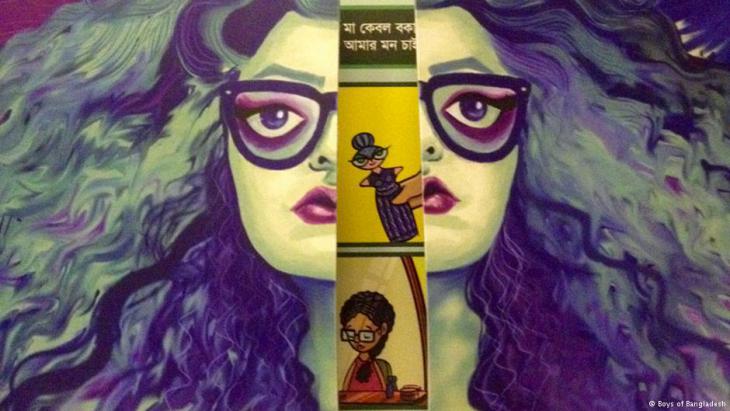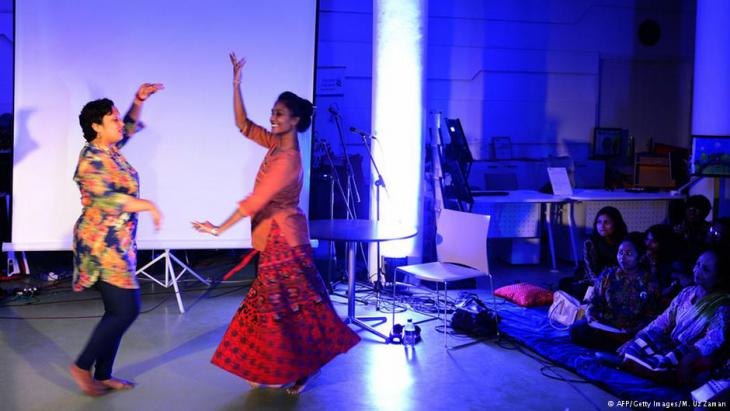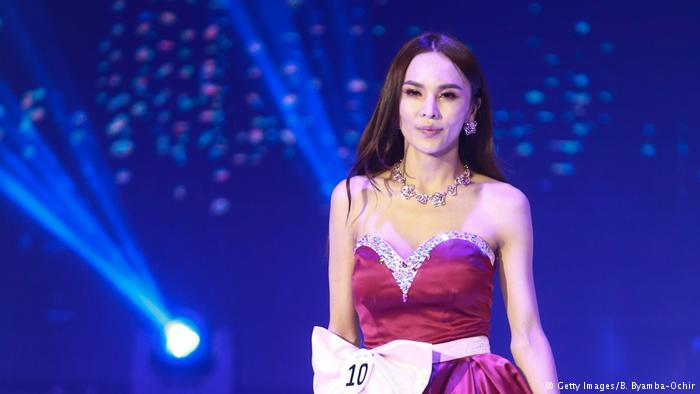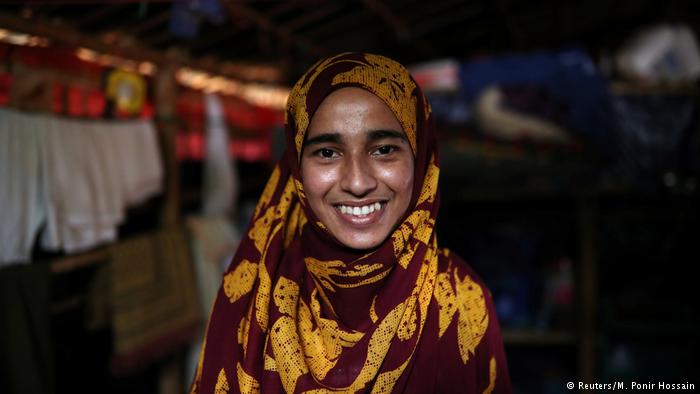Bangladesh’s first lesbian comic strip heroine

Homosexuality is a taboo in Bangladesh, a predominantly Muslim country. To foster awareness about the rights of homosexual people, the country’s largest gay rights group has launched a lesbian comic strip
Her name is Dhee – a young woman living in conservative Bangladesh, who is exploring her sexuality. Dhee, which means “wisdom” in Bengali, falls in love with a girl after discovering that she is not attracted to boys. This story is told by the gay rights group, Boys of Bangladesh, in the country’s first-ever lesbian comic strip launched in the capital Dhaka over the weekend.
In Bangladesh, where 90 percent of the population is Muslim, the project poses a serious risk not only to its creators but also to homosexual people. The majority of gays and lesbians in the South Asian country live in constant fear and have to conceal their sexual orientation in order to avoid harassment. However, in recent years, Bangladesh’s gay community has become increasingly assertive and is now campaigning more vehemently for its rights. Last year, for example, the country’s first magazine for homosexuals was launched with little opposition. “Dhee,” experts say, is another step in the same direction.
Khan, who does not want her full name to be revealed, is one of the four content developers of the comic strip. In an interview with Esther Felden, she talks about the idea behind the comic and what her team hopes to achieve with it. She also discusses the general issue of homosexuals in Bangladesh.
Felden: What do you aim to achieve with the comic strip?
Khan: We created “Dhee” to educate and sensitise people about what it is like to be a homosexual in Bangladesh; what homosexuality entails; and what sexuality means in general. We want people to be more open towards gender diversity. The comic strip also touches upon issues such as women’s empowerment and women’s freedom.
In short, “Dhee” is not only about sexuality and sexual orientation; it includes all sorts of problems that persist in our society relating to gender identities as well as gender discrimination. “Dhee” aims to challenge retrogression.
Could it be considered provocative by some people?
We are talking about sex, which is a taboo in Bangladesh. We have received support from a lot of people with our endeavour, but there are also many who criticise. We are receiving death threats and hate mails from some groups. So yes, it does provoke a lot of people who aren’t comfortable talking about homosexuality. The subject hurts a lot of people’s religious and cultural sentiments.
Why do you hope this comic strip might change the situation of homosexuals in the country?
The comic strip presents the story of an average Bangladeshi middle-class girl living in a suburb. The girl, who identifies herself as a lesbian, is in her late 20s. What we hope to achieve by narrating Dhee’s story is that people are sensitised to the plight of the homosexuals in the country, as well as to the discrimination these people face everyday in all spheres of society.
We want people to understand that most of their misconceptions and prejudices against homosexuals are actually baseless. We want to present a positive story and hope that it will become acceptable.

The comic strip is in the shape of flash cards. Each flash card has a comic on the front and a related text on the back – each set contains ten flash cards with ten stories, as well as related information and educational material
Have you been discriminated because of your sexual orientation?
Not because of my sexual orientation, but because of my gender. Dhee’s story is about harassment due both to sexual orientation and gender identity. Personally, as a woman living in Bangladesh, I face discrimination on a daily basis. I can tell you so many stories about people who have to deal with discrimination because of their sexual orientation and gender – people who have been fired from their jobs, people who could not join the army, or people who could not even get health insurance.
Given the fact that homosexuality is considered a crime in Bangladesh, what is everyday life like for gays and lesbians in the country?
Yes, it is considered a punishable crime. Section 377 of Bangladeshi law criminalises any “unnatural sexual activity”. It does not clearly state “homosexuality”, but for some reason homosexuality has been linked to Clause 377. Having said that, it remains a theoretical issue since no trial has ever taken place under Section 377. Recently, some girls eloped and were later caught by the security officials. They turned out to be lesbians, but their case was filed under human trafficking, not under 377.
How do you distribute the comic strips? Can you sell them at newspaper stands and stores?
No, for now it is not for sale. “Project Dhee” is to stage 16 events in different regions of Bangladesh, and there it will be handed out to the participants.
What do you aim to achieve with the comic strip?
Khan: We created “Dhee” to educate and sensitise people about what it is like to be a homosexual in Bangladesh; what homosexuality entails; and what sexuality means in general. We want people to be more open towards gender diversity. The comic strip also touches upon issues such as women’s empowerment and women’s freedom.
In short, “Dhee” is not only about sexuality and sexual orientation; it includes all sorts of problems that persist in our society relating to gender identities as well as gender discrimination. “Dhee” aims to challenge retrogression.
Could it be considered provocative by some people?
We are talking about sex, which is a taboo in Bangladesh. We have received support from a lot of people with our endeavour, but there are also many who criticise. We are receiving death threats and hate mails from some groups. So yes, it does provoke a lot of people who aren’t comfortable talking about homosexuality. The subject hurts a lot of people’s religious and cultural sentiments.
Why do you hope this comic strip might change the situation of homosexuals in the country?
The comic strip presents the story of an average Bangladeshi middle-class girl living in a suburb. The girl, who identifies herself as a lesbian, is in her late 20s. What we hope to achieve by narrating Dhee’s story is that people are sensitised to the plight of the homosexuals in the country, as well as to the discrimination these people face everyday in all spheres of society.
We want people to understand that most of their misconceptions and prejudices against homosexuals are actually baseless. We want to present a positive story and hope that it will become acceptable.

Bangladesh artists perform at a Dhee fundraiser: in recent years, the gay community has become increasingly assertive
Have you been discriminated because of your sexual orientation?
Not because of my sexual orientation, but because of my gender. Dhee’s story is about harassment due both to sexual orientation and gender identity. Personally, as a woman living in Bangladesh, I face discrimination on a daily basis. I can tell you so many stories about people who have to deal with discrimination because of their sexual orientation and gender – people who have been fired from their jobs, people who could not join the army, or people who could not even get health insurance.
Given the fact that homosexuality is considered a crime in Bangladesh, what is everyday life like for gays and lesbians in the country?
Yes, it is considered a punishable crime. Section 377 of Bangladeshi law criminalises any “unnatural sexual activity”. It does not clearly state “homosexuality”, but for some reason homosexuality has been linked to Clause 377. Having said that, it remains a theoretical issue since no trial has ever taken place under Section 377. Recently, some girls eloped and were later caught by the security officials. They turned out to be lesbians, but their case was filed under human trafficking, not under 377.
How do you distribute the comic strips? Can you sell them at newspaper stands and stores?
No, for now it is not for sale. “Project Dhee” is to stage 16 events in different regions of Bangladesh, and there it will be handed out to the participants.
How many copies have you printed?
We have printed about 4,000 copies. The comic strip is in the shape of flash cards. Each flash card has a comic on the front and a related text on the back – each set contains ten flash cards with ten stories, as well as related information and educational material on the back.
What′s the public response been like so far?
We did not expect the whole thing to go viral. We expected it to circulate around a certain group of people. But the exposure and the feedback that we got – both positive and negative – is just overwhelming. It is really great to see that so many people have appreciated it. It is just the start. We are happy that it is finally happening, and we are even happier with its reception.
Interview: Esther Felden






